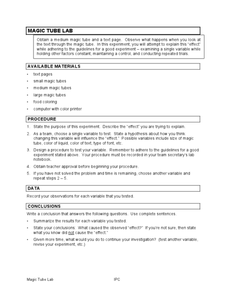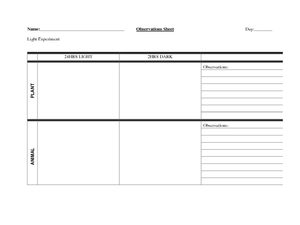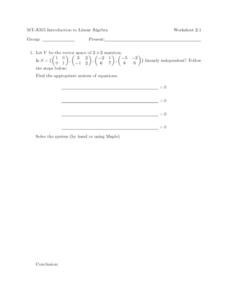Curated OER
All Aboard! All Aboard! The Essay Train
Third graders enjoy a train ride with The Little Engine That Could and discover how to create a five-paragraph essay train. This clever lesson plan has students use each boxcar of the train as a template for a paragraph.
Curated OER
Northern Racism and the New York City Draft Riots of 1865
Students analyze primary source illustrations and personal accounts of the New York City Draft riots. They draw conclusions about the existence and power of Northern racism toward African Americans
Curated OER
Is It Alive?
Eighth graders define the boundaries of living organisms. They determine what makes something a living organism and identify factors that constitute "living." Pupils write a conclusion about the evidence they found that yeast is alive...
Curated OER
Magic Tube Lab
In this scientific investigation worksheet, students use "magic tubes" to make observations, hypothesize, study variables in experiments, write procedures, and draw conclusions.
Curated OER
Where In the World is the Dominican Republic?
Students begin the lesson by discussing how where they live affects how they live. As a class, they add examples to each category such as home types, clothing, jobs and food. Using those categories, they write about their life in the...
Curated OER
Text to Self Connections
Students read the story Ira Sleeps Over and write something about the end of the story that they have a connection with in their own life. In this text to self lesson plan, students look for something that helps them relate to the story...
Curated OER
Measuring the Speed of a Wave
Students create an experiment in which they measure the speed of a wave and record the data in a graph. They work in small groups to write the procedure for the experiment and share it with another group for cross checking of the...
Curated OER
Organisms – Their Needs
Students compare and contrast different organisms characteristics. For this life science lesson, students design an experiment about plants and animals needs. They collect data and write their conclusion about the experiment.
Curated OER
Introduction to Linear Algebra 2.1
In this linear equation worksheet, students identify the vector space of a given matrices and find the appropriate system of equations for each of four solutions. Then they solve the system and write their conclusion.
Curated OER
Narrative Writing Outline
Students explore the elements of a narrative for its purpose, type of audience, mood, main character, minor characters, setting, and conflicts in the story. A story outline is developed and a five paragraph essay composed in this lesson.
Curated OER
Using Children's Literature to Teach Writing: No, David!
Students review beginning, middle, and end of a story and how details add to a story.
Curated OER
Song Writing: Recording Your Song
In this music worksheet, students read an excerpt on recording with a company, who the producer is, and what arrangements need to be made. They respond to six short answer questions related to recording their own song in a studio.
Houghton Mifflin Harcourt
Amazing Animals: Challenge Activities (Theme 4)
For kids who have already mastered the basic concepts in the Houghton Mifflin Harcourt thematic units on amazing animals, here's a packet of enrichment activities sure to provide food for fertile minds.
West Contra Costa Unified School District
Scientific Method Mania
Horrible science puns only happen periodically, but the scientific method is forever. Young scientists observe two presentations on the scientific method, complete independent practice worksheets, and integrate their knowledge through a...
University of North Carolina
Philosophy
Philosophers ask some of life's biggest questions about the nature of mankind, existence, and time, so what's it like to study the subject? A handout outlines different types of philosophy assignments common in college-level courses. The...
PBS
Predicting/Making a Hypothesis
As an introduction to the hypothesis and testing method of investigation, young history detectives engage in a special investigation of a family artifact. After watching a short video that demonstrates the method, they develop a...
Curriculum Corner
Inferencing
Inferencing is a necessary reading skill to uncover non-explicit messages in text. Use the set of resources as a way to guide learners toward becoming expert inferrers through reading prompts and literature with text and without text.
Scouts
The Deadly Picnic: A Lab on Deductive Reasoning
Whodunnit? Find out who killed Mr. Brooks through a logical examination of evidence. Class members fill out a couple of data tables to help them pin down the suspect. After they've figured out just who the culprit is, pupils compose...
Museum of Tolerance
Music Evokes Memories and Emotions
Dim the lights, take a deep breath, and press play to explore the emotions and memories that music elicits. Class members begin using relaxation techniques designed to create a positive listening experience. As music plays, learners...
Concord Consortium
Two Pounds to Go
How hard can it be to measure out two pounds? A short performance task introduces a situation where a balance scale is broken. It gives a method for measuring out two pounds and asks learners to evaluate the procedure. They must prove...
Turabian Teacher Collaborative
Introductions: Formulating Problem Statements
Describing a problem efficiently doesn't solve it, but a well-crafted argument can move readers to action. High schoolers focus on structuring problem statements by reading examples of strong essays and working in groups to create...
New York State Education Department
TASC Transition Curriculum: Workshop 10
How have educational standards evolved? Educators of adults examine expectations in the 10th workshop out of 15 to better determine how standards have grown. Participants respond to a variety of sample questions to determine how they...
Avi Writer
Crispin: The End of Time
Crispin: the End of Time is the core text for this teaching guide, a valuable resource for those who use Avi's trilogy as whole-class reading, in book circles, or as independent reading.
California Education Partners
Linflower Seeds
How does your garden grow? Use proportions to help Tim answer that question. By using their understanding of proportional relationships, pupils determine the number of seeds that will sprout. They create their own linear...
Other popular searches
- Conclusion Writing
- Science Conclusion Writing
- Writing Conclusion Sentences
- Essay Writing Conclusion
- Esl Writing Conclusions
- Writing Conclusions Essay
- Writing a Conclusion 3 5
- Persuasive Essay Conclusion
- Writing Conclusion Paragraphs
- Conclusions Persuasive Essay
- \"Persuasive Essay Conclusion\























